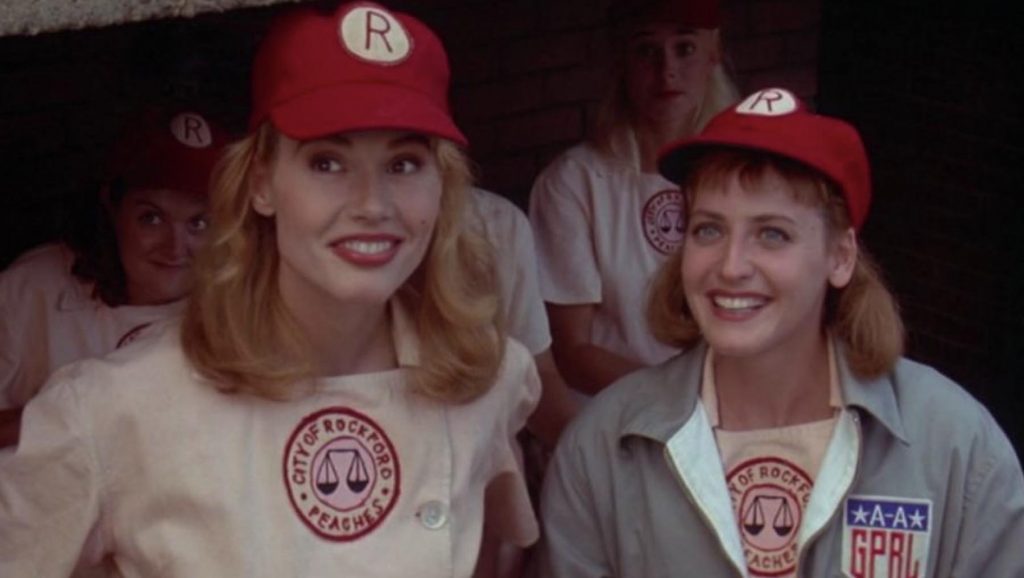In April, I did a Gamefilm series in The Times-Tribune counting down my top 10 favorite sports movies of all time, which I’ll probably share on the blog as well. About a week before we launched the series, I went for a walk with my mom and told her about the project. She knows her son well and was able to guess correctly which sports films made my list. However, she noticed one glaring omission.
“You’ve got to have ‘A League of Their Own’ on this list,” she said.
It didn’t make my top 10. Of the 12 members of the combined sports staffs of The Times-Tribune and The Citizens’ Voice, it only made three lists. My esteemed colleague Donnie Collins ranked it his favorite. Many questioned me during and after the series’ run, “How could you not have ‘Rocky’ on your list?” … “Where is “Bull Durham?” … “Why do you hate “Caddyshack?” I adore a lot of sports films. In fact, when I first brainstormed the list I had 30 movies that had to make the cut. It took a lot of effort to get it down to 10. Just because it didn’t make my top 10 doesn’t mean I don’t think those films are awesome. They’re phenomenal and so is “A League of Their Own.”
It’s a story about the All-American Girls Professional Baseball League, which was formed during World War II because of men fighting overseas. It focuses mostly on the Rockford Peaches. Former Peaches pitcher Mary Pratt, who was believed to be the last surviving member of the original team, died Wednesday at 101.
It had been a few years since I watched “A League of Their Own” from start to finish. I often catch parts of it on TV. So a few days ago I set aside a couple hours to rewatch it for this post. It holds up very well for a movie almost 30 years old. I still enjoy it just as much as, if not more than, the first time I saw it.
So this one’s for you, mom.
Like my Gamefilm series, I’ll break down “A League of Their Own” in six categories: Most Valuable Player, Rookie of the Year, Veteran performance, Sixth man, Blown calls and One shining moment. The guide to the categories is posted below.

Most Valuable Player
When I watched “A League of the Their Own” a few days ago, the film’s wealth and development of characters stood out most. While Geena Davis (Dottie Hinson) and Tom Hanks (Jimmy Dugan) certainly contended for MVP, the full product wouldn’t be possible without Penny Marshall’s impressive directing.
It’s difficult to balance as many characters as “A League of Their Own” provides, but Marshall accomplishes it. The audience gets to know most of the Rockford Peaches, including Hinson, Kit Keller (Lori Petty), Mae Mordabito (Madonna), Doris Murphy (Rosie O’Donnell), Marla Hooch (Megan Cavanagh), Betty “Spaghetti” Horn (Tracy Reiner), Evelyn Gardner (Bitty Schram), Shirley Baker (Ann Cusack), Helen Haley (Anne Ramsay), Ellen Sue Gotlander (Freddie Simpson), Alice Gaspers (Renee Coleman) and Beverly Dixon (Kelli Simpkins). That’s 12 players the audience can name a characteristic about and that doesn’t even touch Dugan, Miss Cuthbert (Pauline Brailsford), Ira Lowenstein (David Strathairn), Walter Harvey (Garry Marshall), Erni Capadino (Jon Lovitz) and Bob Hinson (Bill Pullman). That brings the total to 18 characters for which the audience can remember at least one scene. And how can I forget Stilwell (Justin Scheller/Mark Holton)?
“A League of Their Own” also benefits from Marshall’s female perspective. This is a movie about women with men around it. It needs that female presence and Marshall achieves that. For instance, there’s a difference between how Wonder Woman is shot in 2017’s “Wonder Woman,” directed by Patty Jenkins than in 2017’s “Justice League,” directed by Zack Snyder and Joss Whedon.
I also appreciated that the film didn’t portray all men as bad people. Some treated the female ballplayers very poorly, but some supported them. That was more realistic. The film also needed to capture the status of women during that time period and Marshall presents that perfectly. It’s crazy to think about at this point, but women’s place at that time was at home. Also, Marshall shows the way the ballplayers were presented to the public in a sexist way, but adds humor. For instance, one of the players is great at baseball, but also makes a great cup of coffee. It makes the audience laugh, but also makes it realize these players were not just sold on their athletic ability.
That shows how well Marshall balances the humor with drama. I enjoy the montages, backed by Hans Zimmer’s score. At the same time, a player can receive a telegram that her husband died overseas and that could fit in the same movie.
“A League of Their Own” is fun to watch, but also tells an important and incredible story of the women’s baseball league. Marshall deserves a lot of the credit for that.

Rookie of the Year
Megan Cavanagh’s first Internet Movie Database credit is her role as Marla Hooch in “A League of Their Own.” Much like her character, she knocks it out of the park.
Ernie Capadino (Jon Lovitz) is looking for talent to compete in the women’s league. After picking up Hinson and Keller, he stops by to see Hooch hit. She’s a great hitter, but according to Capadino she isn’t pretty enough to be in the league. Hooch’s father, Hinson and Keller convince him to take her and she ends up as the cleanup hitter for the Rockford Peaches.
Cavanagh has great comedic chops for her first feature first. She’s the butt of a few brutal jokes, the most memorable comes during a promotional video for the league. All of the players are shown with close-ups as the camera is purposely trying to also capture their beauty. When it gets to Hooch, the camera is far away and the voiceover simply says, “And how about Marla Hooch? … What a hitter!”
It cracks me up when the ballplayers are forced to go to the lessons to be lady-like and Hooch is ahead of the pack struggling to show any sort of elegance. She also has a great scene in a bar where she’s drunkenly singing to her eventual husband Nelson (Alan Wilder).
On top of that, she shares an emotional moment with her father early in the film. Her teammates also embrace her as they are all at her wedding. Cavanagh accomplishes a lot with limited screen time as all of her scenes prove memorable.

Veteran performance
In a film with a lot of supporting characters, Geena Davis (Dottie Hinson) carries the leading role. An Oscar winner (“The Accidental Tourist”) and Academy Award nominee (“Thelma & Louise”) before “A League of Their Own” was released, Davis brings her experience to her role as the league’s best player. While the film is packed with plenty great performances, Davis is at the center of them all. She forms a bond with Dugan, all the other players look up to her and she has to battle with herself as she tries to figure out if she wants to play the game or put all of her time into supporting her husband. She also struggles in a tense relationship with her kid sister.
She’s the audience’s entry point into the film and we’re with her every step of the way. That’s a lot of pressure to put on an actor and Davis handles it like a veteran.

Sixth man
There were a lot of options here. Madonna (Mae Mordabito) not only stands out in the film, but her song “This Used to be My Playground” plays during the credits. She also has a pretty great scene showing off her dancing ability. It’s a great all-around performance.
Rosie O’Donnell (Doris Murphy) provides great comedy and a poignant and emotional scene during the team’s bus ride.
However, it’s difficult to top the great Tom Hanks. He leads the most popular scene in the film (“There’s no crying in baseball”) and comes out swinging every time he enters a sequence. This is a bit of a departure for him as Hanks usually plays the good guy. Although he eventually comes around in the end, Hanks spends most of the film portraying a jerk. He does it well and his transition to caring about the team and the women is seamless.
Hanks claims the biggest laughs in the movie, many I can’t get into here. He also has some great one-on-one moments with Davis, especially when he tries to convince her character to stay for the World Series after she quits the team.
“It just got too hard,” Hinson says.
Dugan: “It’s supposed to be hard. If it wasn’t hard, everyone would do it. The hard is what makes it great.”
Hanks went on to win back-to-back best actor Oscars in 1994 (“Philadelphia”) and 1995 (“Forest Gump”).

Blown (questionable) calls
I found the Kit Keller character childish and pretty unlikable. The basis of the role is set up for the audience to empathize with Keller. However, her constant whining made me take Hinson’s side in pretty much every situation. That’s the blown call of the film. It leads into the questionable call. I call it questionable because it doesn’t make the movie worse. I just don’t enjoy watching the particular scene. Let’s get into it. This is … the Dottie Hinson conspiracy.
Hinson is the best player in the league and she overshadows her sister Keller’s accomplishments every step of the way. It didn’t bother me because Keller spends most of the movie acting like a baby. However, it’s a movie so obviously in Game 7 of the World Series Keller comes up to bat, a half inning after she squandered the lead when her sister almost took her head off with a two-run single. There are two outs in the bottom of the ninth and Racine has a runner on first. Rockford 2, Racine 1. Hinson calls time and tells Ellen Sue Gotlander what to throw to her sister.
Hinson: “High fastballs. She can’t hit ’em. She can’t lay off ’em.” (This is a callback to earlier in the film)
That proves true on the first two pitches as Keller swings and misses. However, down to her last strike, she goes the other way and belts the ball to right field. The runner scores from first and Keller is going for a triple … until she runs through the stop sign and heads home where her sister is waiting with the ball. Keller runs her over and Hinson DROPS THE BALL. Racine wins the World Series and Keller is finally the hero.
The conspiracy … did Hinson drop the ball on purpose? It’s purposely ambiguous. The audience doesn’t know for sure. In my opinion, she did. No way she drops the ball in that situation otherwise. There’s a similar play earlier in the film and Hinson takes the hit with ease and holds onto the ball. I think Hinson wanted her sister to have that moment. After the play, she is seen smiling in the dugout as her sister celebrates with her team on the other side of the field. There’s a lot more evidence, but the Hinson conspiracy can be its own post.
As a very competitive person, it’s tough to watch. Also, as an audience we’re with the Peaches every step of the way and we want to celebrate the triumph. However, I understand why the film went the direction it did. I know some people who love what happened and also believe Hinson didn’t drop the ball on purpose. That’s perfectly plausible as well and there’s a lot of evidence to support that theory. I’ve just never been able to watch the movie in that way. But here’s the thing, it bothers because I care so much. And I care so much because this movie is so darn good. It makes me emotionally invested.

One shining moment
The easy choice is “There’s no crying in baseball.” However, the scene I found most rewarding during the rewatch was the Peaches reunion at the very end. I almost started crying when Hinson reconnects with her teammates years later and the audience finds out what they have been up to. Hinson runs into an older Stilwell and finds out his mother died and he’s there in her honor. Hinson walks up to a picture of Dugan, where the audience found out he had died before women were inducted into the Hall of Fame. The women ask Ira Lowenstein to cut ribbon for the grand opening of their section of the Hall because he fought for the league’s existence.
Hinson also reunites with Keller. The camera slowly pans over some great and touching photos of the players and the women’s reactions to them make it more emotional. They sing the league’s song and the original Peaches have their picture taken together, which fades into the older photo of the team. All of this is accompanied by a gorgeous piece of music that complements the scene perfectly.
It’s a beautiful culmination of an all-around great film.
Happy Mother’s Day, mom. And to all the mothers out there, I hope you have a chance to celebrate in some way. I know you’ve earned it.





